As an important advanced manufacturing base in China, the Yangtze river delta is shouldering the historic task of building a science and technology innovation highland with global influence. Nanjing is second only to Shanghai in the Yangtze river delta and plays an important leading role. As the driving force of a new round of scientific and technological revolution, multiple intelligences are converging in Nanjing on how to give full play to the scientific innovation and economic development of the Yangtze river delta.

On January 12, "2019 Nanjing academician lecture hall and Yangtze river delta artificial intelligence industry forum” was held in the center of the Nanjing Jianye district ecological river island of science and technology innovation, which directed by Nanjing municipal people's government, hosted by the Chinese Association of Artificial Intelligence and Nanjing Jianye district people's government, organized by ecological island economic development zone management committee of science and technology, Sino-Singapore Nanjing Eco Hi-tech Island Development Co.,Ltd., Iflytek Co., ltd of Nanjing, Jiangsu province.
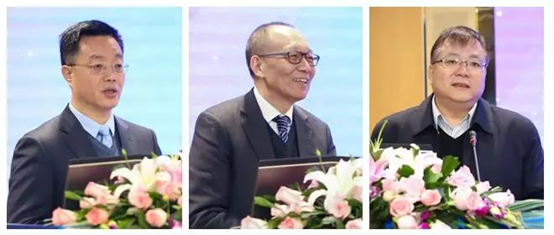
Cao Shu(left), Li Deyi(center), He Xiaolon(right)
Member of Chinese academy of engineering, the president of CAAI, CAAI Fellow Li Deyi, and Cao Shu, the chairman of the CPPCC in Nanjing Jianye district , respectively made speeches for the forum. The speech segment was presided over by Li Fangyi, the standing deputy district chief of Nanjing Jianye district people’s government. He Xiaolong, deputy director of the national industrial development research center of information security; Fu Hao, Nanjing business bureau deputy director of the science and technology commission; Qi Wei deputy inspector of Nanjing commerce bureau and other relevant department heads of Nanjing development and reform commission (NDRC), commission of economy and informatization, and commerce bureau,and some related leaders of Nanjing Jianye district eco hi-tech island management committee of science and technology, as well as some department heads of reform bureau, technology bureau, and commerce bureau of Jianye district were all attending the activity. Jiang Changjun, vice president of CAAI, president of DongHua university, CAAI/IET Fellow; And Liu Hong, professor of Peking University and CAAI fellow presided over the activity.

Li Fangyi(left), Jiang Changjun(center), Liu Hong(right)
This regional event jointly created by the government, society and enterprises aims to promote the linkage and connection between national academic and technological resources and regional industrial development, explore the path of deep integration of artificial intelligence and real economy in the Yangtze river delta region, and drive regional industrial upgrading and innovative development.
In addition to the reports of several academicians and well-known experts, the event also held the CAAI member service center (Jiangsu station) unveiling ceremony, the signing ceremony of the institute of artificial intelligence of China Industrial Control Systems Cyber Emergency Response Team of the Ministry of Industry and Information Technology, and the press conference of the 2018 white paper on innovation assessment of artificial intelligence industry. As one of the organizers, CAAI will radiate the professional and precise service capacity to the Yangtze river delta, further expand the national service network, and consolidate the regional service capacity through this activity, starting from Nanjing.
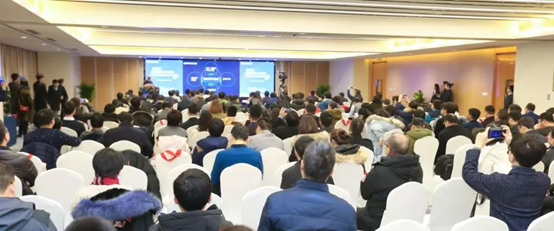
Gather innovative resources
"Academician lecture hall" to contribute to the development of artificial intelligence industry
Built by CAAI, " Nanjing Academician Lecture Hall " is a high-end academic and technological exchange platform, which led by academicians and enterprise leaders as main speakers, oriented personages from governments, enterprises, colleges and universities, and other relevant fields, focused on issues such as the connotation and denotation of artificial intelligence, intelligent science and technology talents cultivation, intelligent technology and industry development problems to make professional, depth and forward-looking analysis and interpretation.
At the "Nanjing cademician lecture hall", academicians and experts made systematic analysis and suggestions on how to promote the revolutional upgrade of digitalization and intelligence, so as to provide support for talent cultivation and scientific and technological innovation development in the Yangtze river delta region.
Chinese academy of engineering, president of the CAAI, CAAI Fellow Li Deyi made the theme speech of future: learning wheeled robot, the Chinese academy of engineering, Central South University professor, CAAI Fellow Gui Weihua explained the artificial intelligence power manufacturing upgrading, member of Chinese academy of engineering, director of the national engineering technology research center for information technology in agriculture, CAAI fellow Zhao Chunjiang shared outlook of agricultural robot, Yan Shuicheng, vice president of 360 group and president of 360 artificial intelligence research institute, and Tan Chang, president of iFlytek big data research institute, respectively made keynote speeches on AI security and digital economy.
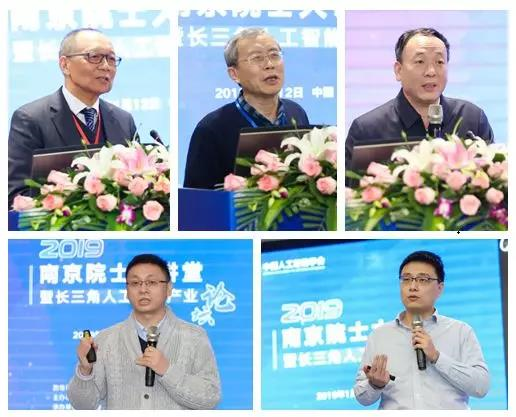
Top row: Li deyi, Gui Weihua, Zhao Chunjiang
Bottom row: Yan Shuicheng, Tan Chang
Promote the innovation of Nanjing Primacy Index
Two major platform projects were unveiled and signed
CAAI member service center (Jiangsu station)
Building a national and even global three-dimensional service network, creating a regional linkage and coordination platform, promoting the rapid development of regional ai industry, realizing the precise service of regional members, and boosting the growth and development of members are the core goals of the CAAI in building a local member service center.
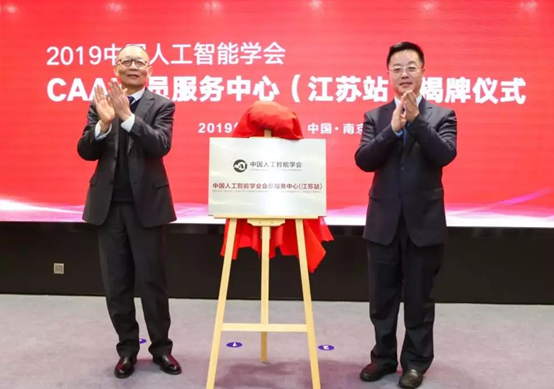
Based on the idea of Jiangsu province and serving the Yangtze river delta, CAAI member service center (Jiangsu station) was officially unveiled at the event. After its establishment, Jiangsu station will connect relevant government units, universities, enterprises, industry associations and other parties in Jiangsu province and surrounding areas to form a complete ecological circle and realize complementary advantages and coordinated development.
At the same time, the Chinese association of artificial intelligence takes Jiangsu station as its bridgehead, and exports its unique resources in academic, technological and commercial fields to its members in the region. It helps local personnel training and integration of production, education and research, and injects vitality into local scientific and technological innovation and development.
Institute of artificial intelligence, China Industrial Control Systems Cyber Emergency Response Team, Ministry of Industry and Information Technology
China Industrial Control Systems Cyber Emergency Response Team (CIC) actively takes the advantage of state-level think-tankresearch institutions and industry resources, take the artificial intelligence industry headquarters as bases and platforms for research and development, gathers ecological elements and resources of artificial intelligence industry, and focuses on high-end intelligent industrial cluster. CIC will work with Singapore Nanjing Eco Hi-Tech island to construct an artificial intelligence technology, product, application and testing laboratory, and a public service platform in the field of artificial intelligence.
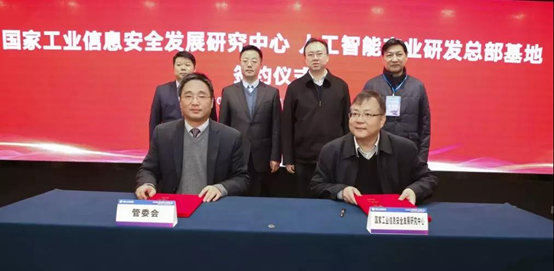
Nanjing has been promoting the "two landing, one integration" (the landing of scientific and technological achievements projects, the landing of new research and development institutions, the integration of university and local development) as an important starting point of building an innovative city, promoting the integration of science and education research and development platform and innovative technology enterprises, and expelling the industrialization of scientific and technological achievements.
As an important platform for Nanjing to gather global resources and start intelligent innovation, Nanjing Eco Hi-Tech island is committed to serving global scientific and technological innovation enterprises and creating an international industrial ecosystem. The settlement of the two projects will have an important impact on building a three-dimensional industrial ecological network nationwide and even globally, creating a regional linkage and coordination platform, promoting the rapid development of regional artificial intelligence industry, and boosting the growth and development of regional science and technology enterprises.
Insight into industry convergence trends
The white paper on ai industry innovation assessment 2018 was released
To draw the outline of artificial intelligence in 2018 to a comprehensive industry development status, the evaluation of the future development trend, help clear technology research and development and application of artificial intelligence enterprise innovation direction, guide the traditional enterprise faster access to intelligent upgrade the concrete policies and methods of the Chinese society of artificial intelligence and organize a line of experts from all walks of life, carefully research and several rounds of argumentation, completed the white paper on 2018 industrial innovation evaluation of artificial intelligence.
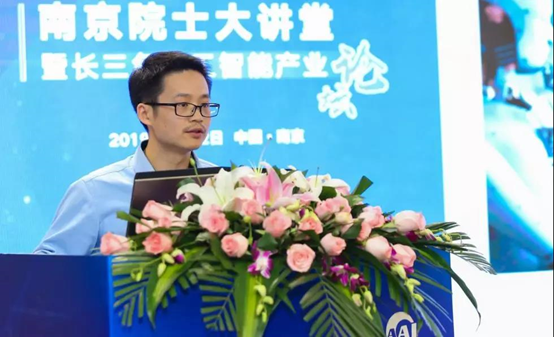
Li Xiangqian
At the event, Dr Li Xiangqian, deputy director of the institute of artificial intelligence of the national center for industrial information security and development, released the 2018 AI industry innovation assessment white paper. The white paper not only makes a comprehensive analysis of the policies, technologies, applications and capital of artificial intelligence at home and abroad, but also puts forward a technology and application science evaluation system of "2 first-level indicators" and "8 second-level indicators" through investigation and data analysis. By 2020, AI will help unleash more new drivers in the fields including retail, security and finance.
The successful holding of 2019 Nanjing academician lecture hall and BBS of artificial intelligence industry in Yangtze river delta and the implementation of a series of projects will provide strategic reference and power fulcrums for the development of artificial intelligence industry in Nanjing and the Yangtze river delta. In this regard, the CAAI will continue to work with all parties to continuously promote regional precision services and contribute to local science and technology and economic development.
- Government
- Association




